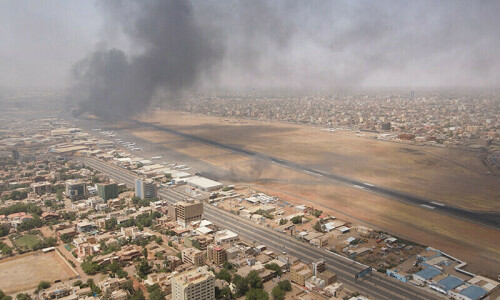
KHARTOUM: The US announced sanctions on Thursday on Sudanese leaders it blamed for the collapse of US and Saudi-brokered ceasefire efforts after shelling and air strikes killed 18 civilians at a Khartoum market.
“We are following through by levying economic sanctions, imposing visa restrictions against actors who are perpetuating the violence,” US National Security Advisor Jake Sullivan said in a statement.
Fighting continued on Thursday, with witnesses reporting “heavy artillery” in north Khartoum, days after the two sides had agreed to extend by five days an initial week-long ceasefire.
In both north and south Khartoum on Wednesday, troops loyal to army chief Abdel Fattah al-Burhan attacked key bases of the RSF led by commander Mohamed Hamdan Daglo.
Over dozen dead in Khartoum attack after army abandons talks
“Eighteen civilians were killed and 106 wounded” by army artillery fire and aerial bombardments on Wednesday on a market in Khartoum, a committee of human rights lawyers said.
The toll was confirmed by a neighbourhood group that organises aid, which said the situation was “catastrophic” and appealed for medical help and blood donations.
‘Sanctions a tool’
Thursday’s action marks the first punitive measures imposed under an executive order signed by US President Joe Biden in May that paved the way for new Sudan-related sanctions amid the fighting.
Washington targeted Algunade, which it said is a Sudanese holding company controlled by RSF Commander Dagalo and his brother; Tradive General Trading L.L.C., a front company controlled by RSF Major Algoney Hamdan Dagalo, another brother; Sudan’s largest defence enterprise Defence Industries System; and arms company Sudan Master Technology.
Washington also issued an updated business advisory to highlight growing risks to US business and individuals exacerbated by the conflict, including trade in gold from a conflict-affected area, US Secretary of State Antony Blinken said in a separate statement.
“Sanctions are a tool,” according to Sudan expert Alex de Waal, who calls the northeast African country “a classic case where sanctions never solved the problems” they had meant to.
Looting of food
World Food Programme chief Cindy McCain condemned on Thursday “the looting of WFP food and assets happening right now in El Obeid”, 350 km southwest of Khartoum.
“Food for 4.4 million people is at stake,” McCain wrote on Twitter.
More than half the population — 25 million people — are now in need of aid and protection, the UN says. Since fighting erupted on April 15, more than 1,800 people have been killed.
Published in Dawn, June 2nd, 2023















































Dear visitor, the comments section is undergoing an overhaul and will return soon.